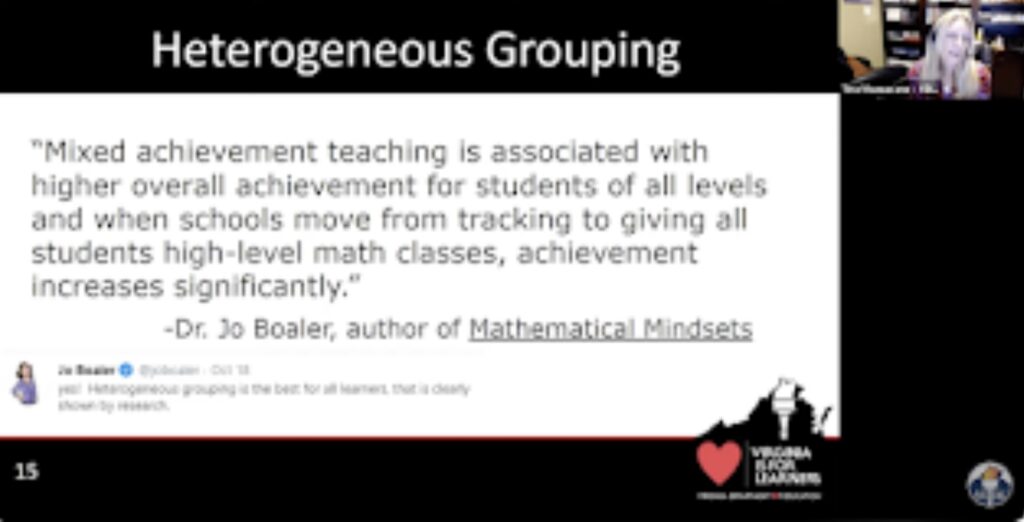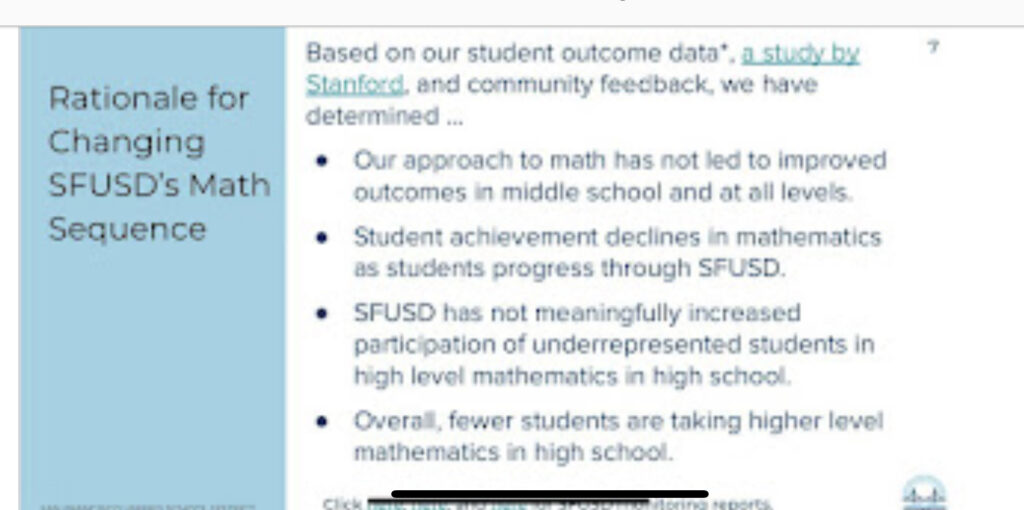 by Todd Truitt
by Todd Truitt
On March 5, 84% of San Francisco voters voted in favor of a referendum for San Francisco Unified School District (SFUSD) to bring back Algebra for 8th graders, overturning their prior ill-fated math reform (a “no middle schooler let ahead” math policy). What does this vote have to do with Virginia?
The Virginia Department of Education (VDOE) had initially proposed a similar policy for Virginia as part of its Virginia Math Pathways Initiative (VMPI) in 2021. As noted below, VMPI cited Stanford Education Professor Jo Boaler and resources primarily using SFUSD’s misrepresented preliminary data as “empirical evidence” for VMPI’s similar initial proposal.
San Francisco’s “Algebra for None” Policy and Its Immediate Effects
SFUSD revised its math program in 2014 based on the ideas of Boaler, requiring heterogeneous math classes and restricting Algebra until 9th grade. By 2018, Boaler and SFUSD were claiming success based upon SFUSD’s preliminary data (subsequently exposed as having been misrepresented).
At the same time, a flood of middle class and well-off families pursued workarounds, thereby creating opportunity gaps with less advantaged kids. As a result, the City of San Francisco (not SFUSD) began funding workarounds for less advantaged kids. Meanwhile, SFUSD’s math head used the tired trope that those who opposed the inequity of its “Algebra for None” policy were only affluent parents fighting for their own children to get ahead.
VMPI Proposed a Policy Similar to SFUSD for Virginia Statewide
As part of VMPI, the VDOE initially proposed a policy for the entire State of Virginia like the SFUSD “Algebra for None” experiment. VMPI condensed Pre-Algebra and selected portions of Algebra, Geometry and Algebra II into a Grade 8-10 “Essential Concepts Course,” thereby delaying Pre-Algebra until 8th grade. Like SFUSD, classes through grade 10 would be heterogeneous (i.e., everyone taking the same course with no honors versions) and VMPI would “drastically [reduce] the need for” or “eliminate” acceleration.
VMPI primarily cited the following sources for this proposition, both of which principally used SFUSD’s preliminary (misrepresented) data as empirical evidence:
- The Catalyzing Change book series of the National Council of Teachers of Mathematics (NCTM) (a Reston, Virginia-based pro-math reform organization of K-12 math teachers); and
- The de-tracking statement issued by National Council of Supervisors of Mathematics (NCSM).
Similarly to SFUSD, VMPI even cited Boaler in its presentation (contrary to Boaler’s “clearly shown by research” claim in the cited Tweet, there’s strong evidence that non-heterogeneous ability grouping helps all students):

After immediate blowback from the public (imagine the Virginia polling on this issue, looking at San Francisco’s vote), the VDOE quickly “clarified” that school districts would still be able to offer acceleration and intensified classes (such clarification did not include when those options should occur). Based on several factors, including evidence that certain Democratic voters switched to Glenn Youngkin to oppose VMPI (a prelude to the crushing referendum vote in San Francisco), Youngkin killed VMPI upon taking office in early 2022.
SFUSD “Algebra for None” Policy Confirmed a Failure
A parent group first found in 2021 that SFUSD and Boaler were significantly misrepresenting the preliminary data. In March 2023, a study by professors from Stanford University confirmed that SFUSD’s preliminary data had been misrepresented. Fortunately, SFUSD has seen the light and is now on track to bring back Algebra for 8th graders. SFUSD provided the following to their Board in January 2024 about the results of its failed experiment:

NCSM, NCTM and Boaler Are Silent about the Misrepresentation of SFUSD Data
To this day, neither NCSM nor NCTM has issued a correction about their use of SFUSD’s misrepresented preliminary data (NCTM also ardently supported VMPI). Moreover, NCTM still offers a professional development webinar about SFUSD as a Catalyzing Change “success story” (from December 2022, long after publicity about SFUSD’s data problems). At its 2023 convention, NCTM’s keynote speech referred to non-heterogeneous ability grouping as “dehumanizing” and supporting “academic and social apartheid” despite strong evidence that ability grouping helps all students.
Boaler subsequently faced widespread public scrutiny for the use of countless false and misleading citations in the 2023 California Math Framework (CMF) (detailed in a critical article and interview in The Chronicle of Higher Education). She refuses to answer questions about her use of SFUSD’s similarly misrepresented data.
Virginia Public Schools Must Provide Accelerated and Advanced Math Opportunities
Famous Virginia education scholar E.D. Hirsch theorized that if public schools do not teach certain facts (e.g., accelerated and advanced math opportunities), children with means will continue to learn such information through private schools, tutors and/or their parents (i.e., widening equity gaps). SFUSD provided a real-life example.
The general public clearly understands this reality, as demonstrated by the reaction to VMPI and in the San Francisco referendum vote. But some in the education world appear to still be in denial (e.g., NCSM, NCTM, Virginia Council for Math Supervision).
A number of children in San Francisco have paid the price for such experiments, which Virginia children luckily avoided. As Virginian Hirsch pointed out decades ago, equity is furthered by public schools providing academic opportunities for all, not removing them.
Todd Truitt is a parent of two school-age children in Arlington County, Virginia. He is also the Chair of the Math Advisory Committee for Arlington Public Schools and active in the Arlington Democrats. He is a business transactions attorney and a Certified Public Accountant.

Leave a Reply
You must be logged in to post a comment.